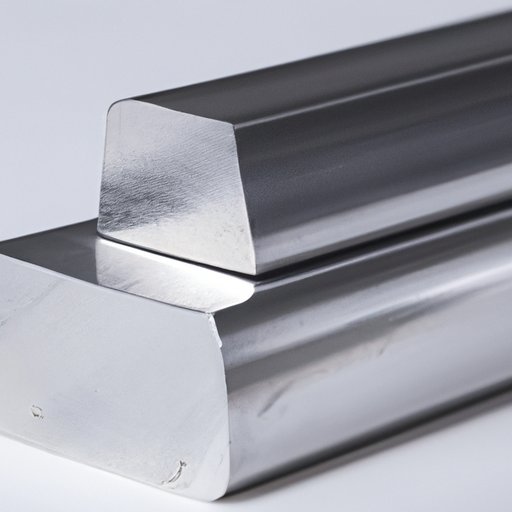Introduction
Specific heat capacity is a physical property of materials that describes how much energy is needed to raise the temperature of one gram of a substance by one degree Celsius. It is an important factor to consider when selecting materials for various applications, as it can affect the performance of the material in different temperature environments. One such material with a high specific heat capacity is aluminum, which is a versatile metal with many uses in both industry and everyday life.
How Aluminum’s Specific Heat Capacity Makes it a Versatile Material
Aluminum has a very high specific heat capacity, meaning it can absorb and hold large amounts of heat energy without significantly increasing in temperature. This makes it an ideal material for applications where temperature control is important, such as refrigeration systems and electronic components. Additionally, aluminum’s high specific heat capacity means it can be used in temperatures ranging from -273 degrees Celsius (absolute zero) to over 1,000 degrees Celsius, making it suitable for a wide range of applications.
The benefits of aluminum’s high specific heat capacity don’t end there – it also has excellent thermal conductivity, meaning it can quickly transfer heat from one area to another. This makes it a great choice for applications such as heat sinks, radiators, and cooling systems. Furthermore, aluminum’s high strength-to-weight ratio makes it an ideal material for lightweight structures such as aircraft and spacecraft.
The Role of Specific Heat Capacity in Aluminum Production
Understanding the process of aluminum production is key to understanding the role of specific heat capacity in the process. Aluminum production involves extracting alumina (aluminum oxide) from bauxite ore, then electrolyzing it to separate the oxygen atoms, leaving pure aluminum metal. The electrolysis process requires a lot of energy – in fact, around 15% of total global aluminum production is consumed by the electricity required for this process.
The specific heat capacity of aluminum plays an important role in the electrolysis process. As the aluminum is heated up, it absorbs the heat energy and gradually increases in temperature. This gradual increase prevents the aluminum from melting, allowing it to be extracted in a solid form. Without aluminum’s high specific heat capacity, it would not be possible to produce aluminum in the same way.
A Comprehensive Look at Aluminum’s Specific Heat Capacity
Examining the relationship between temperature and aluminum’s specific heat capacity helps us understand why it is so useful in different applications. At high temperatures, aluminum’s specific heat capacity is relatively low, meaning it cannot absorb as much heat energy before increasing in temperature. However, at lower temperatures, aluminum’s specific heat capacity is much higher, allowing it to absorb and store large amounts of heat energy before increasing in temperature.
Investigating the relationship between aluminum’s specific heat capacity and industrial applications provides further insight into why it is such a versatile material. For example, aluminum is often used in power plants and factories due to its ability to absorb and store large amounts of heat energy. This allows the plants and factories to use the stored heat energy to drive their operations, reducing their reliance on external sources of energy.
Conclusion
Aluminum’s specific heat capacity is an important factor to consider when selecting materials for different applications. Its high specific heat capacity allows it to absorb and store large amounts of heat energy, making it an ideal choice for applications such as refrigeration systems, heat sinks, and cooling systems. Additionally, its high strength-to-weight ratio makes it a great choice for lightweight structures. Finally, its high specific heat capacity plays an important role in aluminum production, allowing it to be extracted in a solid form.
In conclusion, aluminum’s specific heat capacity is an important factor to consider when selecting materials for different applications. Its high specific heat capacity makes it a versatile material that can be used in a wide range of applications, from refrigeration systems to aircraft and spacecraft. Understanding the relationship between temperature and aluminum’s specific heat capacity is key to understanding why it is such a useful material.

